Reminiscing
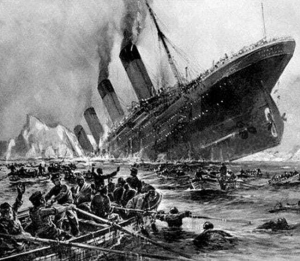
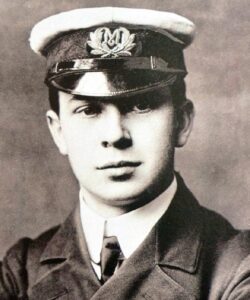 The radioman had done his best. He tried to warn the radioman on RMS Titanic about the dangers lurking in the dark, moonless night…icebergs. Mistakenly believing that Titanic was unsinkable, 25-year-old John George “Jack” Phillips, a British sailor and the senior wireless operator aboard the Titanic during her ill-fated maiden voyage in April 1912, was too busy to listen or heed the warnings. So, the radioman on SS Mesaba turned off his radio and went to bed, making the ship unaware of the disaster the Titanic was experiencing after she hit an iceberg and began to sink. Many rules of the sea changed after that, and from then on, the radio had to be monitored 24/7…in case a disaster happened again. Sadly, safety laws come after disasters.
The radioman had done his best. He tried to warn the radioman on RMS Titanic about the dangers lurking in the dark, moonless night…icebergs. Mistakenly believing that Titanic was unsinkable, 25-year-old John George “Jack” Phillips, a British sailor and the senior wireless operator aboard the Titanic during her ill-fated maiden voyage in April 1912, was too busy to listen or heed the warnings. So, the radioman on SS Mesaba turned off his radio and went to bed, making the ship unaware of the disaster the Titanic was experiencing after she hit an iceberg and began to sink. Many rules of the sea changed after that, and from then on, the radio had to be monitored 24/7…in case a disaster happened again. Sadly, safety laws come after disasters.
So, what happened to the ship that tried to save the Titanic? I had never given that any thought, but now, more than 110 years after the Titanic sank after striking an iceberg, I read that SS Mesaba, the ship that sent warnings to the famous vessel has also been discovered on the ocean floor. Of course, this was not a surprise to those who found the ship, because they knew what had happened to the ship. Those who knew…researchers at Bournemouth University and Bangor University in Wales, sent a team, using multibeam sonar to find the now famed “ship that tried” to save Titanic.
What I didn’t know, until now, was that just six years after the sinking of RMS Titanic, the SS Mesaba was sunk in the Irish Sea during World War I. Mesaba was making a convoy voyage from Liverpool to Philadelphia on September 1, 1918, when a German U-boat’s torpedo took out the merchant ship, killing twenty people. Titanic was finally found in 1985, but the “ship that tried” to save her, took more than 100 years to locate. Possibly it was because of all the new technology we have, including sonar, which “uses sound waves to measure the distance between a sound source and various objects in its surroundings. This kind of method can be used for navigation, communication, and mapping. It is also frequently used by underwater vessels.” The Bangor researchers used active sonar to map the seabed, and also identified the Mesaba wreckage by emitting pulses of sounds and listening for echoes. Innes McCartney, who is a researcher with Bangor, says the multibeam sonar is a “game-changer” for marine technology. Finally, SS Mesaba’s final resting place is known, although 
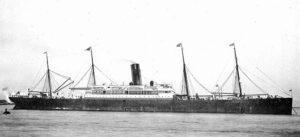 that doesn’t change anything for the ship. After all these years of wondering, the ship will stay right where it is, although it may be explored now and any valuables can be removed by the team, who was the first to locate, and is therefore eligible to salvage if they choose to.
that doesn’t change anything for the ship. After all these years of wondering, the ship will stay right where it is, although it may be explored now and any valuables can be removed by the team, who was the first to locate, and is therefore eligible to salvage if they choose to.
 As we all know, Adolph Hitler was a liar and a murderer. He really never made a move that wasn’t calculated and devious. On September 1, 1939, German forces under the control of Adolf Hitler bombarded Poland on land and from the air. The invasion was more than just a taking of territory. Hitler knew that he might need that area later, and so he did. Hitler had been murdering people that didn’t fit into his mold of “life that had value” and that included Jews, the mentally or physically handicapped, and later gypsies and other ethnicities. Basically, he wanted to eliminate anyone that wasn’t Aryan. Aryan is a word relating to a hypothetical ethnic type illustrated by or descended from early speakers of Indo-European languages. To Hitler it meant white, with blond hair and blue eyes. Oddly, while Hitler had blue eyes, his hair was brown. Somehow that “problem” with his definition of Aryan didn’t concern Hitler. I guess he was happy to be a “special Aryan.” In reality, there are different kinds of Aryans. They can be found with blond, red, brown, white, or black hair, so that wasn’t really an issue either. Hitler considered himself Aryan because he was a native German-speaker, and he knew the definition of “Aryan” as it was used in those days. I don’t think it was ever about Aryan, per se, but rather about getting rid of any group that he decided that he didn’t like.
As we all know, Adolph Hitler was a liar and a murderer. He really never made a move that wasn’t calculated and devious. On September 1, 1939, German forces under the control of Adolf Hitler bombarded Poland on land and from the air. The invasion was more than just a taking of territory. Hitler knew that he might need that area later, and so he did. Hitler had been murdering people that didn’t fit into his mold of “life that had value” and that included Jews, the mentally or physically handicapped, and later gypsies and other ethnicities. Basically, he wanted to eliminate anyone that wasn’t Aryan. Aryan is a word relating to a hypothetical ethnic type illustrated by or descended from early speakers of Indo-European languages. To Hitler it meant white, with blond hair and blue eyes. Oddly, while Hitler had blue eyes, his hair was brown. Somehow that “problem” with his definition of Aryan didn’t concern Hitler. I guess he was happy to be a “special Aryan.” In reality, there are different kinds of Aryans. They can be found with blond, red, brown, white, or black hair, so that wasn’t really an issue either. Hitler considered himself Aryan because he was a native German-speaker, and he knew the definition of “Aryan” as it was used in those days. I don’t think it was ever about Aryan, per se, but rather about getting rid of any group that he decided that he didn’t like.
Hitler’s main purpose for the invasion of Poland was to regain lost territory and ultimately rule their eastern neighbor. Mostly, however, Hitler wanted the world to know exactly how he planned to wage war. This would become the “blitzkrieg” strategy. The Blitzkrieg was a term used to describe “a method of offensive warfare designed to strike a swift, focused blow at an enemy using mobile, maneuverable forces, including armored 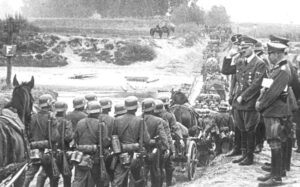 tanks and air support. Such an attack ideally leads to a quick victory, limiting the loss of soldiers and artillery. After the German forces had plowed their way through, devastating a swath of territory, infantry moved in, picking off any remaining resistance.”
tanks and air support. Such an attack ideally leads to a quick victory, limiting the loss of soldiers and artillery. After the German forces had plowed their way through, devastating a swath of territory, infantry moved in, picking off any remaining resistance.”
Hitler was methodical. He established a base of operations within the target country. Then, he immediately began setting up “security” forces to take out anyone who disagreed with his Nazi ideology, whether racial, religious, or political. He set up concentration camps for slave laborers and the extermination of uncooperative civilians. It didn’t take long for the target nation, in this case Poland to become a conquered nation under German rule. Just one day after the German invasion of Poland, Hitler was busy setting up SS “Death’s Head” regiments to terrorize the people. He was preparing for his planned terror.
The Polish army tried to fight back, but they made several severe strategic miscalculations in those early days. Even with an army of 1 million soldiers, the lack of the necessary equipment was a severe detriment to the Polish forces as they attempted to take the Germans head-on, when maybe they should have fallen back to defensive positions. I think the natural way to face an enemy, is head-on. We try to “show no fear” when attacked, but in the end, this thinking, while admirable was probably behind the times, at least in battle, and the brave Polish soldiers were no match for the overwhelming and modern-mechanized German forces. To make matters worse, any hope the Polish soldiers might have had of a Soviet counter-response was lost with 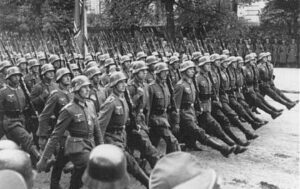 the signing of the Ribbentrop-Molotov Nonaggression Pact…”a non-aggression pact between Nazi Germany and the Soviet Union that partitioned Eastern Europe between them. The pact was signed in Moscow on 23 August 1939 by German Foreign Minister Joachim von Ribbentrop and Soviet Foreign Minister Vyacheslav Molotov and was officially known as the Treaty of Non-Aggression between Germany and the Union of Soviet Socialist Republics. Unofficially, it has also been referred to as the Hitler–Stalin Pact, Nazi–Soviet Pact or Nazi–Soviet Alliance.” Germany invaded Poland on September 1, 1939. Great Britain responded with bombing raids over Germany three days later.
the signing of the Ribbentrop-Molotov Nonaggression Pact…”a non-aggression pact between Nazi Germany and the Soviet Union that partitioned Eastern Europe between them. The pact was signed in Moscow on 23 August 1939 by German Foreign Minister Joachim von Ribbentrop and Soviet Foreign Minister Vyacheslav Molotov and was officially known as the Treaty of Non-Aggression between Germany and the Union of Soviet Socialist Republics. Unofficially, it has also been referred to as the Hitler–Stalin Pact, Nazi–Soviet Pact or Nazi–Soviet Alliance.” Germany invaded Poland on September 1, 1939. Great Britain responded with bombing raids over Germany three days later.
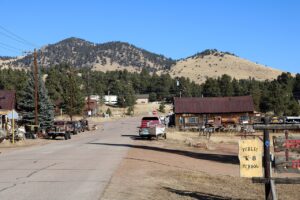
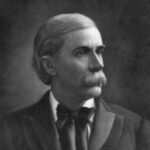 The town of Guffey, Colorado got its start in 1890 with the promise of gold and big money. It quickly attracted prospectors from all over the country. The Cripple Creek mine was just 30 miles away from town, and so the town was the perfect supply hub for mining claims that were expected to spring up between Cripple Creek and Guffey. When Guffey was established, the mining camp was called Idaville, but shortly thereafter its name was changed to Freshwater.
The town of Guffey, Colorado got its start in 1890 with the promise of gold and big money. It quickly attracted prospectors from all over the country. The Cripple Creek mine was just 30 miles away from town, and so the town was the perfect supply hub for mining claims that were expected to spring up between Cripple Creek and Guffey. When Guffey was established, the mining camp was called Idaville, but shortly thereafter its name was changed to Freshwater.
Guffey was actually legally incorporated in 1895, and it was immediately booming as a mining, lumbering, and ranching community. The Freshwater Mining District wasn’t just about gold mines. The area also produced copper, lead, and other minerals. The minerals that could be mined in the area made Guffey a center of activity. For most, gold was the big draw, mostly because they didn’t understand the value of the other minerals, like we do now, with new technologies and new uses for minerals. On August 31, 1896, the Colorado Daily Chieftain reported, “All of the arrangements have been completed, and negotiations closed for the construction of a cyanide mill on Currant Creek, of a capacity of 60-tons per day. The mill is now assured beyond any doubt, and ground will be broken for its construction within a fortnight. The capitalists behind the enterprise are Roadhaven and Vanderpool, of Saint Louis, who have visited the camp several times, investigating our mines and ores, with William Goodman of Cripple Creek, who has been largely instrumental in consummating this enterprise. They claim to be able to treat $7 ore at a profit, which it is claimed will make of Freshwater the biggest camp in the world. The townspeople have guaranteed the company 50 tons of ore per day. This step locates Freshwater beyond the boundary of a prospecting camp and places it in the list of producers.”
The town would receive another name change in the late 1890s, this time due to the fact that there was another town with the same name in California. In honor of James McClurg Guffey, an oilman and capitalist, the town was named Guffey. The town was known throughout the region for its dances, which included lots of fiddlers and other musicians. Guffy reached its peak during this period, with over 500 residents and 40 businesses…most of which were brought in with the promise of gold.
While there were many mines and prospects around Guffey, the total production recorded was disappointingly minor. The cattle ranches and lumber operations located nearby supported Guffey while mining wasn’t profitable. In reality, the town was probably more suited for ranching anyway. Soon many of the businesses began to leave. The Park County Bulletin, dated January 17, 1902, stated, “With this issue, the GUFFEY PROSPECTOR will cease publication. This is due in part to the fact that the camp has another paper and to the additional fact that the Freshwater districts have failed, so far, to develop sufficiently to support a newspaper. The PROSPECTOR has for some time been published from the BULLETIN office, and while working faithfully for the camp, it has never been a paying investment. Those in the Freshwater districts who wish to settle their accounts with the paper can do so with Captain Sylvis at the Guffey post office. To those who wish it, the BULLETIN will be continued to their address, and we will try to make it meet their requirements as always up with the news of Park County. We still have faith in the Freshwater districts and believe that, when sufficient depth has been obtained, there will be pay mines made and profitable mining is done.”
Before long, the people started to move away too. While Guffey still exists today, the community has only around 49 residents and relies heavily on tourism. There are still several of the original structures remaining and are actually occupied. The others have been kept up, though empty, so that the town can keep its historic value and possible income potential for the future. The town currently has a charter school, restaurant, small museum, and more. Guffey continues to be the center of activity for nearby ranches, some of which are Park County Historic Landmarks, including the Aspen Creek/Bener/Moore Ranch, Campbell Ranch, and Thirty-One-Mile Ranch. So, while the town’s size has dwindled, its usefulness has not. Guffey also sits in a very scenic area created by three ancient volcanoes. The Guffey volcanic center is part of the Thirty-nine Mile Volcanic area, the largest remnant of the Central Colorado volcanic field. There are two mineral springs just a mile south of Guffey, that feature spring waters bubbling up from large mounds over 20 feet high and 50 feet across.
Sadly, not all is well in Guffey. As in any town, crime can happen. In January 2001, the bodies of three members of the Dutcher family were found near Guffey. They had been murdered. Later, three teenagers were convicted of the crime. Apparently these three boys had decided to form a paramilitary organization. They were supposedly practicing for future action they planned to take in the country of Guyana. The murders were part of their “practice sessions.” The brutal nature of the crime and its bizarre motive attracted national attention, but really not the kind of attention that the town wanted to be famous for.
The town does have some real oddities that it doesn’t mind being famous for. It would be considered a “somewhat ghost town” and strangely, has a habit of electing animals as Mayor. In fact, while the two main political parties are the Democrats and the Republicans, the current Mayor, Monster the Cat was elected in 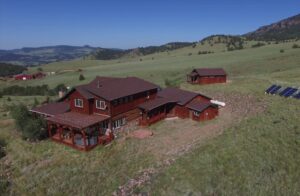
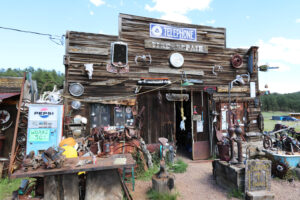 1998. Lydia Reynolds of Guffey’s 31 Mile Ranch and Bill Sioux of Guffey Garage left us a comment confirming Monster was still alive and well…as of November 2019 anyway. I suppose that in a small town, you could get away with an animal as mayor, but for most of us, that would definitely be odd. Nevertheless, I guess it just adds to the charm of this quaint, old town.
1998. Lydia Reynolds of Guffey’s 31 Mile Ranch and Bill Sioux of Guffey Garage left us a comment confirming Monster was still alive and well…as of November 2019 anyway. I suppose that in a small town, you could get away with an animal as mayor, but for most of us, that would definitely be odd. Nevertheless, I guess it just adds to the charm of this quaint, old town.
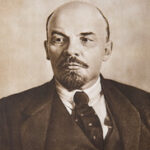
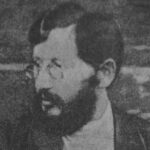 Soviet leader Vladimir Lenin had just finished speaking at a factory in Moscow, when Fanya Kaplan, a member of the Social Revolutionary party shot him twice. Lenin, the leader of the Bolsheviks was seriously wounded, but survived the attack. The attempted assassination basically set off a “gang war” of sorts, although to a much larger degree…a Civil War, really. That war, known as Red Terror, set off a wave of reprisals by the Bolsheviks against the Social Revolutionaries and other political opponents. As Russia fell deeper into civil war, thousands of people were executed. This had been coming since 1887, but would not fully materialize until the assassination of Petrograd Cheka leader Moisei Uritsky and the attempted assassination of Vladimir Lenin.
Soviet leader Vladimir Lenin had just finished speaking at a factory in Moscow, when Fanya Kaplan, a member of the Social Revolutionary party shot him twice. Lenin, the leader of the Bolsheviks was seriously wounded, but survived the attack. The attempted assassination basically set off a “gang war” of sorts, although to a much larger degree…a Civil War, really. That war, known as Red Terror, set off a wave of reprisals by the Bolsheviks against the Social Revolutionaries and other political opponents. As Russia fell deeper into civil war, thousands of people were executed. This had been coming since 1887, but would not fully materialize until the assassination of Petrograd Cheka leader Moisei Uritsky and the attempted assassination of Vladimir Lenin.
Vladimir Ilich Ulyanov was born on April 22, 1870, in Simbirsk, Russian Empire. After his brother was executed in 1887 for plotting to assassinate Czar Alexander III, Ulyanov became interested in the revolutionary cause, also adopting the pseudonym…Lenin. He decided to study law and upon completion, took up practice in Petrograd, which is now Saint Petersburg. In Petrograd, Lenin began to associate with people from the revolutionary Marxist circles. Soon, he was organizing a Marxist group in the capital to enlist workers to the Marxist cause. He called the new group, “Union for the Struggle for the Liberation of the Working Class.” Following the December 1895, arrest of Lenin and the other leaders of the Union, Lenin was jailed for a year. Upon his release, he was exiled to Siberia for a term of three years.
After his term in jail, and the subsequent exile, Lenin went to Western Europe in 1900, where he continued his revolutionary activity. In 1902, while in Western Europe that he published a pamphlet titled “What Is to Be Done?,” which argued that only a disciplined party of professional revolutionaries could bring socialism to Russia. Of course, most of us know that Lenin was working in the shadows to get back into the Russian Marxist system. In 1903, he met with other Russian Marxists in London and established the Russian Social-Democratic Workers’ Party (RSDWP), but while he tried really hard, there was discord from the start. There remained a split between Lenin’s Bolsheviks (Majoritarians), who advocated militarism, and the Mensheviks (Minoritarians), who advocated a democratic movement toward socialism. There is a saying, about a house divided…it just can’t stand. These two groups increasingly opposed each other within the framework of the RSDWP, and Lenin made the split official at a 1912 conference of the Bolshevik Party.
After the outbreak of the Russian Revolution of 1905, Lenin made his move, and returned to Russia. The revolution, which consisted mainly of strikes throughout the Russian empire, came to an end when Nicholas II promised reforms, including the adoption of a Russian constitution and the establishment of an elected legislature. Then, when order had been restored, as often happens in government, the czar nullified most of these reforms. That forced Lenin to go into exile again in 1907.
Lenin was opposed to World War I, which began in 1914, calling it “an imperialistic conflict” and called on “working-class” soldiers to turn their guns on the capitalist leaders who “sent them down into the murderous trenches.” Lenin was pushing for a socialist agenda by appealing to the middle-income people who felt like they should be given a handout by the government to supplement their income. Little did they know that socialism is never the best solution. War is always hard on the countries involved, but World War I was an unprecedented disaster for Russia. The Russian casualties were greater than those sustained by any other nation in any previous war. The war also left the economy hopelessly disrupted by the costly war effort. By March of 1917, things had gotten so bad that riots and strikes broke out in Petrograd over the scarcity of food. To make matters worse, army troops who had lost confidence in the leadership joined the strikers, and on March 15 Nicholas II was forced to abdicate, which brought to an end centuries of czarist rule. Following the February Revolution, so named because of Russia’s use of the Julian calendar, power was shared between the ineffectual Provincial Government and the soviets, or “councils” of soldiers’ and workers’ committees.
German authorities allowed Lenin and his lieutenants to secretly cross Germany en route from Switzerland to Sweden in a sealed railway car, after the outbreak of the February Revolution. The hope was that the return of the anti-war Socialists to Russia would undermine the Russian war effort, which had been continued under the Provincial Government. Lenin began to push for the overthrow of the Provincial Government by the soviets, an act for which he was condemned as a “German agent” by the government’s leaders. Forced to escape to Finland in July, his call for “peace, land, and bread” met with increasing popular support, and the Bolsheviks won a majority in the Petrograd soviet. Then, in October, Lenin secretly returned to Petrograd, and on November 7th the Bolshevik-led Red Guards took down the Provisional Government and proclaimed soviet rule.
Following the coup, Lenin became the virtual dictator of the world’s first Marxist state. His government made peace with Germany, nationalized industry, and distributed land but beginning in 1918, it all began to fall apart. The nation sank into a devastating civil war against czarist forces. In 1920, the czarists were defeated, and in 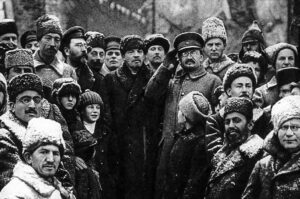
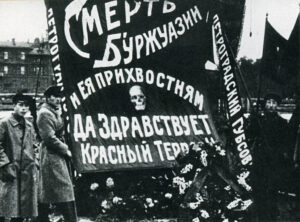 1922 the Union of Soviet Socialist Republics (USSR) was established. Upon Lenin’s death in early 1924, his body was embalmed and placed in a mausoleum near the Moscow Kremlin. Petrograd was renamed Leningrad in his honor. After a struggle of succession, fellow revolutionary Joseph Stalin succeeded Lenin as leader of the Soviet Union. The Lenin years were finally over.
1922 the Union of Soviet Socialist Republics (USSR) was established. Upon Lenin’s death in early 1924, his body was embalmed and placed in a mausoleum near the Moscow Kremlin. Petrograd was renamed Leningrad in his honor. After a struggle of succession, fellow revolutionary Joseph Stalin succeeded Lenin as leader of the Soviet Union. The Lenin years were finally over.

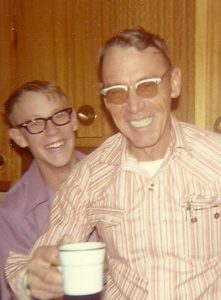 My father-in-law, Walt Schulenberg was such a sweet man, and I miss him very much. He had a gentle yet funny personality, and he was a friend to anyone who knew him. I think that was what made it easy to meet him that first time. When you go to your future in-laws’ home for the first time, you are naturally nervous, but he made me feel at ease, and I have loved him like a second dad ever since. My life was so blessed. I had parents who loved me and who were so good to me, and then I got in-laws that anyone would love to have. How did I get so blessed? I think it was his great personality that made my father-in-law a beloved employee wherever he worked.
My father-in-law, Walt Schulenberg was such a sweet man, and I miss him very much. He had a gentle yet funny personality, and he was a friend to anyone who knew him. I think that was what made it easy to meet him that first time. When you go to your future in-laws’ home for the first time, you are naturally nervous, but he made me feel at ease, and I have loved him like a second dad ever since. My life was so blessed. I had parents who loved me and who were so good to me, and then I got in-laws that anyone would love to have. How did I get so blessed? I think it was his great personality that made my father-in-law a beloved employee wherever he worked.
My father-in-law held a number of jobs over the years, and even the years that I knew him. He worked as a mechanic for Pathfinder Mines (uranium) for a number of years. He quit once an went to work elsewhere, before deciding to go back for a time before switching to maintenance work for Casper College in the mid 80s. While he enjoyed many of his jobs, I think that the years he drove bus for the Casper College T-Birds were some of his favorite years. Not only did he enjoy the students he transported to games, but he got to see some places he might not have been able to see otherwise, and it didn’t cost him anything to go…in fact, he was paid for it. That works.
His working career was long and varied, but I think his retirement years were his real favorites. He had a barn shop in the back yard of his house, and it was there that he got his tinkering fix. He loved to make things and was a skilled carpenter, lawn chair refurbisher, toy maker, rock layer, and a number of other things. He was 
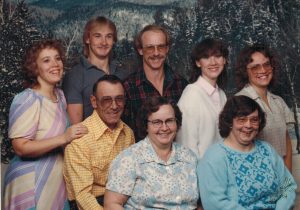 always coming up with new ideas, both for gifts and to sell at the craft fairs his wife Joann Schulenberg and daughter, Brenda Schulenberg loved to do. My father-in-law was a very social person, and really enjoys talking to people. He could often be found standing out in his front yard visiting with people who would stop to look at his wind yard ornaments. It was his recreation, of sorts. He needed that…right up to the end. Today would have been my father-in-law’s 94th birthday. Happy birthday in Heaven, Dad. We love and miss you very much.
always coming up with new ideas, both for gifts and to sell at the craft fairs his wife Joann Schulenberg and daughter, Brenda Schulenberg loved to do. My father-in-law was a very social person, and really enjoys talking to people. He could often be found standing out in his front yard visiting with people who would stop to look at his wind yard ornaments. It was his recreation, of sorts. He needed that…right up to the end. Today would have been my father-in-law’s 94th birthday. Happy birthday in Heaven, Dad. We love and miss you very much.

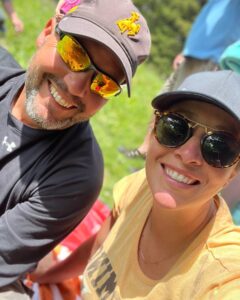 The past year has been a year of spiritual growth for my niece, Lindsay Moore. It’s not that she wasn’t a strong Christian woman, because she really is stronger than most people, and she has had enough trials to break many people, even strong Christians….but, not Lindsay. She grew stronger and stronger. This past year found Lindsay being led to start a Christian podcast, which is going very well. Her podcast is called, “The New Way To Live” and it is excellent. I highly recommend you have a listen.
The past year has been a year of spiritual growth for my niece, Lindsay Moore. It’s not that she wasn’t a strong Christian woman, because she really is stronger than most people, and she has had enough trials to break many people, even strong Christians….but, not Lindsay. She grew stronger and stronger. This past year found Lindsay being led to start a Christian podcast, which is going very well. Her podcast is called, “The New Way To Live” and it is excellent. I highly recommend you have a listen.
Lindsay and her husband, Shannon Moore’s daughter, Mackenzie is growing up so fast. Lindsay took her to her first day of Kindergarten, and now they are getting used to a full day school schedule. Since Lindsay works from home, this is quite a change for both her and Mackenzie. Mackenzie is Lindsay’s mini-me in so many ways, and both of them are very social people, who light up the lives of the people who are blessed to know them. The Moore family are all pretty social, and pretty athletic too. This summer all of them got new bicycles, and now Mackenzie can ride without training wheels. That will make for lots of fun family rides in the evenings.
Lindsay is very active in her church, Harvest Christian Center in Laramie, Wyoming. Lindsay has spoken at 
 several of their conferences, and also helps out with the Vacation Bible School every summer. The Bible school has been a great opportunity for her nephew, Ethan Hadlock, as well as nieces, Aurora Hadlock and Adelaide Sawdon to come and spend a week with her, while attending the Bible school. Lindsay regularly brings a “gang” of kids with her to the daily activities. This year, since they are too old to attend the Bible school, Ethan and Aurora helped out as volunteers. Aurora got to be in Lindsays class as a volunteer. That was especially cool, because Aurora loves to help out. They all had a blast!!!
several of their conferences, and also helps out with the Vacation Bible School every summer. The Bible school has been a great opportunity for her nephew, Ethan Hadlock, as well as nieces, Aurora Hadlock and Adelaide Sawdon to come and spend a week with her, while attending the Bible school. Lindsay regularly brings a “gang” of kids with her to the daily activities. This year, since they are too old to attend the Bible school, Ethan and Aurora helped out as volunteers. Aurora got to be in Lindsays class as a volunteer. That was especially cool, because Aurora loves to help out. They all had a blast!!!
The Moore family took a wonderful two week vacation this summer with their new trailer. They went to Fremont Lake in Pinedale, as well as to Alpine, Thermopolis, the Big Horn Mountains. Then they went to Spearfish, South Dakota, where they got a tour of Shannon’s old stomping grounds…Black Hills State University, where he was a quarterback. Then it was on to Chadron, Nebraska, where Shannon’s parents are campground hosts at Chadron 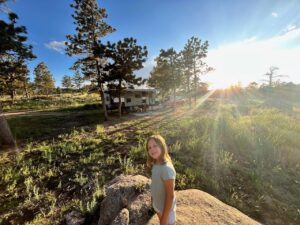
 State Park. They had a great time and very relaxing and visiting with Tom and Mary Jo Moore. Then, they ended their vacation at Vedauwoo, Wyoming for the last 2-3 days. It was a wonderful trip, and a highlight of their summer. Now, it’s on to the next school for Mackenzie and Shannon (as a coach for the University of Wyoming Cowboys), and back to her schooltime activities for Lindsay. Today is Lindsay’s birthday. Happy birthday Lindsay!! Have a great day!! We love you!!
State Park. They had a great time and very relaxing and visiting with Tom and Mary Jo Moore. Then, they ended their vacation at Vedauwoo, Wyoming for the last 2-3 days. It was a wonderful trip, and a highlight of their summer. Now, it’s on to the next school for Mackenzie and Shannon (as a coach for the University of Wyoming Cowboys), and back to her schooltime activities for Lindsay. Today is Lindsay’s birthday. Happy birthday Lindsay!! Have a great day!! We love you!!

 My nephew, Wesley “Wes” Burr, who is my niece, Cassie Franklin’s partner, is a very compassionate man, kind and loving. He is also a giver who would give the shirt off his back or open his home to anyone. He reminds me a lot of my grandparents in that way. He is an all-around good guy. Wes came along at a time when Cassie really needed a kind soul in her life. She had gone through an ugly divorce; the loss of her mom, Rachel Schulenberg; and her grandmother, Janice Franklin. She needed some happiness in her life, and since Wes came into her life, I have never seen her happier. They work together toward their common goals, and they are doing very well.
My nephew, Wesley “Wes” Burr, who is my niece, Cassie Franklin’s partner, is a very compassionate man, kind and loving. He is also a giver who would give the shirt off his back or open his home to anyone. He reminds me a lot of my grandparents in that way. He is an all-around good guy. Wes came along at a time when Cassie really needed a kind soul in her life. She had gone through an ugly divorce; the loss of her mom, Rachel Schulenberg; and her grandmother, Janice Franklin. She needed some happiness in her life, and since Wes came into her life, I have never seen her happier. They work together toward their common goals, and they are doing very well.
Wes loves learning, pretty much all learning, but his favorite things include history and war information. I have  to agree with his types of learning, as I am a history and war buff too, especially World War II. He is also well educated on the subject of mushrooms and gardening. Seriously, I wonder if he is related to my grandparents. They knew lots about foraging for different wild herbs, mushrooms, and berries too. It’s a great way to feed your family, and he loves helping Cassie find flowers and greenery for the crafts she makes. It’s also a great way to get the family outside and teach them about God’s garden.
to agree with his types of learning, as I am a history and war buff too, especially World War II. He is also well educated on the subject of mushrooms and gardening. Seriously, I wonder if he is related to my grandparents. They knew lots about foraging for different wild herbs, mushrooms, and berries too. It’s a great way to feed your family, and he loves helping Cassie find flowers and greenery for the crafts she makes. It’s also a great way to get the family outside and teach them about God’s garden.
Wes is also an aspiring small business owner! Two years ago, he started a cleaning company with Cassie, and it is going well. He is very capable in a number of varying tasks, one of which is changing the fluids in the cars, which as we all know saves people money. Recently he traded some work for an off roading Jeep! they live in an area with lots of places to take a Jeep off road for some family fun. Not everyone can trade work for a 
 vehicle, but it is one of the perks of being self-employed. Wes loves the “nerdy” things, like Xbox and Star Trek, and he is always game for some fun with those.
vehicle, but it is one of the perks of being self-employed. Wes loves the “nerdy” things, like Xbox and Star Trek, and he is always game for some fun with those.
This past year has been a very special one for Wes. In addition to his two bonus kids, Lucas and Zoey, he and Cassie were blessed with his first child…a daughter named Alicen!! Wes is totally smitten with his baby girl, but still makes sure that Lucas and Zoey feel loved too. Recently, Zoey even started calling him Dad, and colored him a “dad” picture. It’s quite obvious that Wes loves kids, and I know he is and will always be a great dad. Today is Wes’ birthday. Happy birthday Wes!! Have a great day!! We love you!!

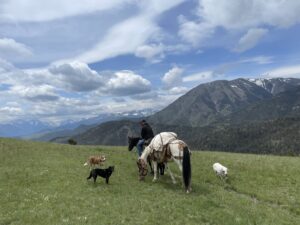 My nephew, Josh Griffith, who became my nephew when he married my niece, Susan Cook Griffith. That was 17 years ago, but recently, Josh had the idea to take Susan on their first “pack” trip. That is where the horses pack your gear into the camp site. The trip was just an overnight trip in the Beartooth Mountains, but it was just the two of them…no kids. Susan said, “It was just him and me, so it kind of felt like it was a date.” It was early in the season so the waters were running pretty high so they tried to find a spot to go to that didn’t involve crossing the creek because they were thinking that it would be pretty high. Probably a good plan. The area that they camped in was also rather deep in grizzly bear country…one of the reasons I wouldn’t like tent camping, but that’s just me. Anyway, they found a spot to set up camp that was about four or five miles from where they had parked the truck. When we finally decided where we were going to pitch the tent, they noticed that about 10 to 15 feet away was a pile of fresh bear scat. That made Susan…just a little nervous, considering the fact that “we were in their territory.” I think I would be nervous too. Nevertheless, they stayed.
My nephew, Josh Griffith, who became my nephew when he married my niece, Susan Cook Griffith. That was 17 years ago, but recently, Josh had the idea to take Susan on their first “pack” trip. That is where the horses pack your gear into the camp site. The trip was just an overnight trip in the Beartooth Mountains, but it was just the two of them…no kids. Susan said, “It was just him and me, so it kind of felt like it was a date.” It was early in the season so the waters were running pretty high so they tried to find a spot to go to that didn’t involve crossing the creek because they were thinking that it would be pretty high. Probably a good plan. The area that they camped in was also rather deep in grizzly bear country…one of the reasons I wouldn’t like tent camping, but that’s just me. Anyway, they found a spot to set up camp that was about four or five miles from where they had parked the truck. When we finally decided where we were going to pitch the tent, they noticed that about 10 to 15 feet away was a pile of fresh bear scat. That made Susan…just a little nervous, considering the fact that “we were in their territory.” I think I would be nervous too. Nevertheless, they stayed.
Now that the trip is over, Susan says. “It was a pretty cool experience. Once we got the camp all set up, we were sitting around the fire and getting ready to cook dinner, our dogs were kind of like ‘what is going on here’ – like what are you guys doing? They could tell that there were predators out there, and they were keeping watch pretty close on our surroundings. It was kind of a spooky feeling. I kept making lots of noise, so no bears or wolves ever came up on us thankfully.” I agree. I’m thankful their trip went well, and they’re home safe.
Susan says that the trip made her really “appreciate the modern conveniences that we have – like running water, toilets, microwaves, stoves, fridges- just like the basic necessities are so nice. Haha! I didn’t realize how much I liked those things until you go a couple days without them and you’re like, OK I can’t wait to get home where there’s running water. We can just turn the faucet on and have an unlimited supply of water. Thank God for 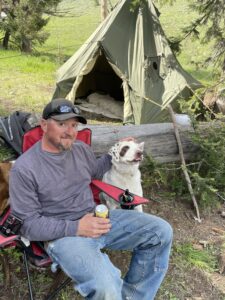
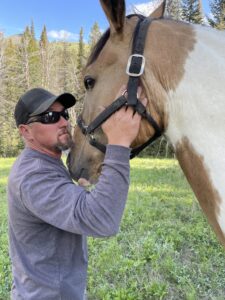 running water. Haha!” I’m sure that Josh hardly gave any of those things any thought, because…well, he’s a guy, and they don’t think about those things when they are camping. For Susan that trip was probably the most unusual “date” she has ever had, and if it weren’t for the fact that she trusts her husband implicitly, she might have backed out.
running water. Haha!” I’m sure that Josh hardly gave any of those things any thought, because…well, he’s a guy, and they don’t think about those things when they are camping. For Susan that trip was probably the most unusual “date” she has ever had, and if it weren’t for the fact that she trusts her husband implicitly, she might have backed out.
They have gone out almost every weekend this summer camping, riding horses, or doing something, so it’s been a pretty fun summer for them. Josh is always willing to go do things with the family, so there’s never a dull moment. Susan tells me that “Josh is such a great dad and husband. I’m the luckiest lady alive! I’m sure if it.” What a sweet tribute!! Today is Josh’s birthday. Happy birthday Josh!! Have a great day!! We love you!!
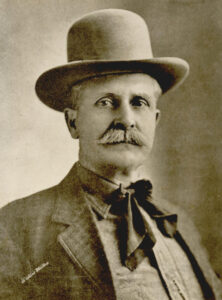 Many of the lawmen of the Old West started out as outlaws, and some of their careers continued to be “questionable” throughout their lives. The Three Guardsmen, was the name given to three lawmen who became legendary in their pursuit of many outlaws of the late 19th century. The men, Deputy US Marshals Bill Tilghman (1854–1924), Chris Madsen (1851–1944), and Heck Thomas (1850–1912) were working under US Marshal Evett “E D” Nix. Tilghman started out as a gunslinger before becoming part of the Three Guardsmen, but he might have been categorized as a “reluctant” gunslinger, since he only resorted to violence, when it was absolutely necessary. Madsen started a criminal career, resulting in several convictions for fraud and forgery, before he became a lawman and member of the Three Guardsmen. Thomas was twelve at the beginning of the American Civil War, when he accompanied his father and his uncle, Edward Lloyd Thomas, to war as a courier. He would have been the exception to the rule in the Three Guardsmen, because he was not an outlaw. Still, if you were going to be a lawman in those days, you had better know your way around a gun.
Many of the lawmen of the Old West started out as outlaws, and some of their careers continued to be “questionable” throughout their lives. The Three Guardsmen, was the name given to three lawmen who became legendary in their pursuit of many outlaws of the late 19th century. The men, Deputy US Marshals Bill Tilghman (1854–1924), Chris Madsen (1851–1944), and Heck Thomas (1850–1912) were working under US Marshal Evett “E D” Nix. Tilghman started out as a gunslinger before becoming part of the Three Guardsmen, but he might have been categorized as a “reluctant” gunslinger, since he only resorted to violence, when it was absolutely necessary. Madsen started a criminal career, resulting in several convictions for fraud and forgery, before he became a lawman and member of the Three Guardsmen. Thomas was twelve at the beginning of the American Civil War, when he accompanied his father and his uncle, Edward Lloyd Thomas, to war as a courier. He would have been the exception to the rule in the Three Guardsmen, because he was not an outlaw. Still, if you were going to be a lawman in those days, you had better know your way around a gun.
In 1889, the state of Oklahoma was in need of a serious “cleaning up” or at least part of it was. The Three Guardsmen were widely considered honest, dutiful, and capable, so I guess they must have turned over a new leaf in their careers. These marshals were responsible for suppressing much of the outlaw element in the Indian Territory and the surrounding area. It is said that they arrested more than 300 outlaws during the next decade, while killing several others. These marshals were all three had the reputation of being determined in their pursuit, regardless of bad weather. Each of the men was known for their unique tracking abilities. Oddly, the 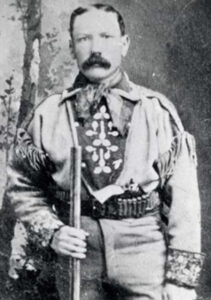 nickname Three Guardsmen was not given to them by the townspeople or the other lawmen, but rather by outlaws they pursued.
nickname Three Guardsmen was not given to them by the townspeople or the other lawmen, but rather by outlaws they pursued.
Thomas carried out a relentless pursuit of the Dalton Gang, during their outlaw career, and was specifically mentioned by gang member Emmett Dalton as one reason the Dalton Gang attempted to rob two banks simultaneously in Coffeyville, Kansas. Their plan was “to make one big score so that they could leave the territory for a time” and get away from Thomas. Resistance from the lawmen and citizens of Coffeyville to this robbery ended with the deaths of most of the members of the gang.
The Three Guardsmen are most famous for their pursuit of the Wild Bunch, or Doolin Gang, which included the surviving members of the Dalton Gang. The three lawmen eliminated many of the members of the Doolin Gang by systematically killing gang members who resisted them and arresting those who would surrender. They would let nothing slide, and they tracked them until they found them. Deputy Marshal Heck Thomas killed gang leader Bill Doolin. Deputy Marshal Chris Madsen led the posse that killed Doolin gang members “Dynamite Dan” Clifton and Richard “Little Dick” West. Deputy Marshal Tilghman was ultimately responsible for the death of Doolin gang member William F “Little Bill” Raidler. Other gang members were also captured or killed by them. Their law careers were filled with success stories that helped to rid the Old West of some of its most notorious killers.
Bill Tilghman retired in 1910 and was elected to the Oklahoma State Senate. On October 31, 1924, at the 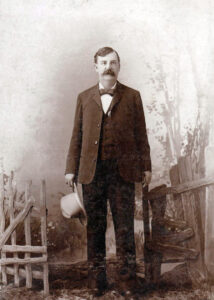 age of 70, Tilghman was murdered by a corrupt prohibition agent named Wiley Lynn, while serving as town Marshal for Cromwell, Oklahoma. The town was a wild place at that time. It was full of brothels, pool halls, and saloons. Tilghman might have been the only thing between the outlaw element and the town, because just one month after his death, the entire town was burned to the ground…leaving no buildings standing. Chris Madsen and other former law enforcement friends of Tilghman were believed to have been responsible, but no investigation into the arsons was ever conducted. I suppose it was a possible retaliation, but we will never know. The town of Cromwell never recovered, and as of the 2000 census, its population was less than 300.
age of 70, Tilghman was murdered by a corrupt prohibition agent named Wiley Lynn, while serving as town Marshal for Cromwell, Oklahoma. The town was a wild place at that time. It was full of brothels, pool halls, and saloons. Tilghman might have been the only thing between the outlaw element and the town, because just one month after his death, the entire town was burned to the ground…leaving no buildings standing. Chris Madsen and other former law enforcement friends of Tilghman were believed to have been responsible, but no investigation into the arsons was ever conducted. I suppose it was a possible retaliation, but we will never know. The town of Cromwell never recovered, and as of the 2000 census, its population was less than 300.
Madsen had retired in 1905 and died in 1944 at the age of 93, after living a relatively peaceful retired life. Heck Thomas retired in 1905, and in 1907 accepted a Chief of Police position in Lawton, Oklahoma. He died in 1912 of Bright’s disease.

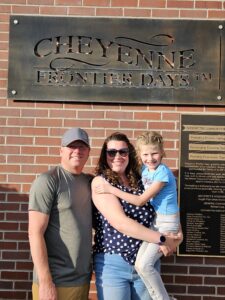 My grandniece, Adelaide “Addi” Sawdon is seven years old today, and she is going into 2nd grade. While Addi is a good student, and truly loves learning, she told her mom, my niece, Jessi Sawdon and her dad, my nephew, Jason Sawdon that “she’s only excited for school because her birthday is two days after school starts.” Addi may not be really excited for school to start, bus I think that is because summer vacation will be over, and I can certainly understand that, but I think that once she gets back into the swing of things, including Girl Scouts. Addi loves being a Girl Scout, and all the activities they get to do. She sells Girl Scout Cookies, and my husband is glad about that, because he loves those cookies.
My grandniece, Adelaide “Addi” Sawdon is seven years old today, and she is going into 2nd grade. While Addi is a good student, and truly loves learning, she told her mom, my niece, Jessi Sawdon and her dad, my nephew, Jason Sawdon that “she’s only excited for school because her birthday is two days after school starts.” Addi may not be really excited for school to start, bus I think that is because summer vacation will be over, and I can certainly understand that, but I think that once she gets back into the swing of things, including Girl Scouts. Addi loves being a Girl Scout, and all the activities they get to do. She sells Girl Scout Cookies, and my husband is glad about that, because he loves those cookies.
A few days ago, Addi told her mom that she wants to be a scientist when she grows up. Being a scientist is a great career, but Addi wants to take it one step further. She wants to be a scientist that performs “musical” experiments. When I saw that, I thought it was an “autocorrect mistake” from her mom’s phone, but it wasn’t. Addi’s mind is clicking right along with amazing ideas. One experiment she wants to try is “putting music into bubbles and then as they pop, she wants to know if you would hear the music. That may seem like “child’s play,” but I think that is a really well thought out experiment 
 idea. I was really proud of this little girl. Addie is very interested in dinosaurs, and seriously, if she could meet a dinosaur, she totally would!! She loves dinosaurs and the little kits that let her “excavate real bones.”
idea. I was really proud of this little girl. Addie is very interested in dinosaurs, and seriously, if she could meet a dinosaur, she totally would!! She loves dinosaurs and the little kits that let her “excavate real bones.”
Recently, she got a “big girl” bed and has had the best nights’ sleep ever! Or so she says. I’m sure that going from those little beds to a nice big bed would make for a great night’s sleep. Another reason Addi loves Summer, is that she gets to go to Vacation Bible School in Laramie with her cousins, Ethan Hadlock, Aurora Hadlock, and Mackenzie Moore. She gets more time to play with her cousins too, because everyone can easily travel, and where they all live in different towns, that can be complicated in snowy weather. She also gets lots of play time with her friends, and let’s face it, playing is much more fun than school. Addi loves spending time with her grandparents, and since they live in a different town, summer is the best time for that. Addi loves the grandparents, because “they all spoil her tremendously.” Or so her mom tells me. As a grandparent myself, I can honestly say that grandparents would never spoil a grandchild…seriously, never!!!
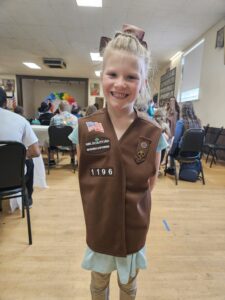
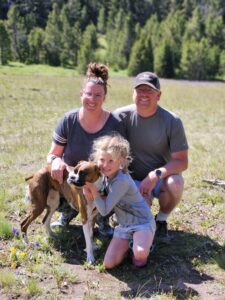
Addi loves to read books…another thing that tells me that she really does love school, just not the end of Summer. She reads very well, and her new favorite kind of books are chapter books. For those who don’t know, chapter books for kids are books that have multiple chapters and are suitable for young readers. The stories are always very interesting. Adi has been riding her bike with amazing speed, something that really took off this summer. She’s also incredibly funny, very sweet, and mostly always helpful around the house…provided a bribe of some sort, ice cream or something is involved. See, I told you she was very smart. Today is Addi’s 7th birthday. Happy birthday Addi!! Have a great day!! We love you!!

